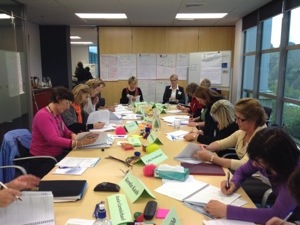A workshop too far
 Using technology for workshops is something I have been doing for many years, running webinars and having guest speakers Skype into a workshop session. Earlier this year we attempted this differently with one of our participants, Jeanette Gellard, joining on Skype from South Korea for a full two days. Quite an achievement for Jeanette when the rest of the group were all face to face in a rather noisy room in a city hotel and the workshop was very interactive!
Using technology for workshops is something I have been doing for many years, running webinars and having guest speakers Skype into a workshop session. Earlier this year we attempted this differently with one of our participants, Jeanette Gellard, joining on Skype from South Korea for a full two days. Quite an achievement for Jeanette when the rest of the group were all face to face in a rather noisy room in a city hotel and the workshop was very interactive!
We simply connected the iPad to a speaker and had a headset on hand for practice activities. Fortunately the internet didn’t let us down and the participant enjoyed the experience and the interaction with the group.
Here are Jeanette’s comments about the experience…..
When is too far away, really too far way? Over the last few years I’ve come to realise that the answer to that question is, Never! Thanks to the development of our communications technology, distance no longer needs to be the barrier that it once was. Skype, Facetime, Viber, Twitter, Instagram, Linkedin, GoTo Meeting and a plethora of other software programs and applications make it relatively easy to stay connected to others. Whether its video, audio, text or image based our capacity to communicate with others and participate in events is really only limited by our access to a good quality internet connection and a device that runs the relevant program or application.
Living in South Korea I have the privilege of being able to access some of the fastest internet connections in the world. What this means in a practical sense is that I get high quality video streamed through my computer or smart-phone which allows me to participate ‘virtually’ in a range of activities from workshops and study tutorials to conversations with friends and family ‘over a cup of coffee’. Over the past six months I’ve ‘attended’ two workshops in Adelaide, South Australia from the comfort of my apartment in Busan, South Korea, some 7,853 km away! Both events were successful from my perspective due to the following key elements.
- The openness of the workshop organisers in considering the inclusion of a ‘virtual’ participant
- The setup of the workshop area which enabled me to see presenters and also for other participants to be aware that I was ‘in attendance’
- The delivery of presentation material prior to or during the workshop via email so that I had the same information as everyone else
- Having a ‘buddy’ who checked up on me throughout the workshop (Could I hear? Could I see? Did I want to say anything?)
- The acceptance of the other workshop participants in having a ‘virtual’ classmate and their willingness to engage with me on a one-on-one basis using the available technology. This included participants randomly ‘dropping by’ to chat with me during workshop breaks.
- Being included in group photos!
From my end there were a couple of things that I put in place to ensure that my participation would be as positive as possible.
- I set myself up in a quiet spot away from distractions and noise
- Used the mute button on my microphone when I wasn’t speaking to make sure any background noise at my end (paper shuffling, typing, heavy breathing…..) wasn’t distracting other workshop participants
- Kept my device on charge throughout the workshop
So next time you think something is too far away to attend, think again! Ask the organisers whether it’s possible to make a ‘virtual’ appearance. Jeanette Gellard, Innovative Influences jeanette@innovativeinfluences.com.au





 I was so impressed I went back to Queensland in October last year and completed the course again along with the Train the Trainer so Sharon and I could facilitate this course together.
I was so impressed I went back to Queensland in October last year and completed the course again along with the Train the Trainer so Sharon and I could facilitate this course together. On Thursday and Friday last week Sharon and I facilitated our “Facilitation Skills Workshop”. We enjoyed working with our enthusiastic participants in this interactive workshop.
On Thursday and Friday last week Sharon and I facilitated our “Facilitation Skills Workshop”. We enjoyed working with our enthusiastic participants in this interactive workshop.